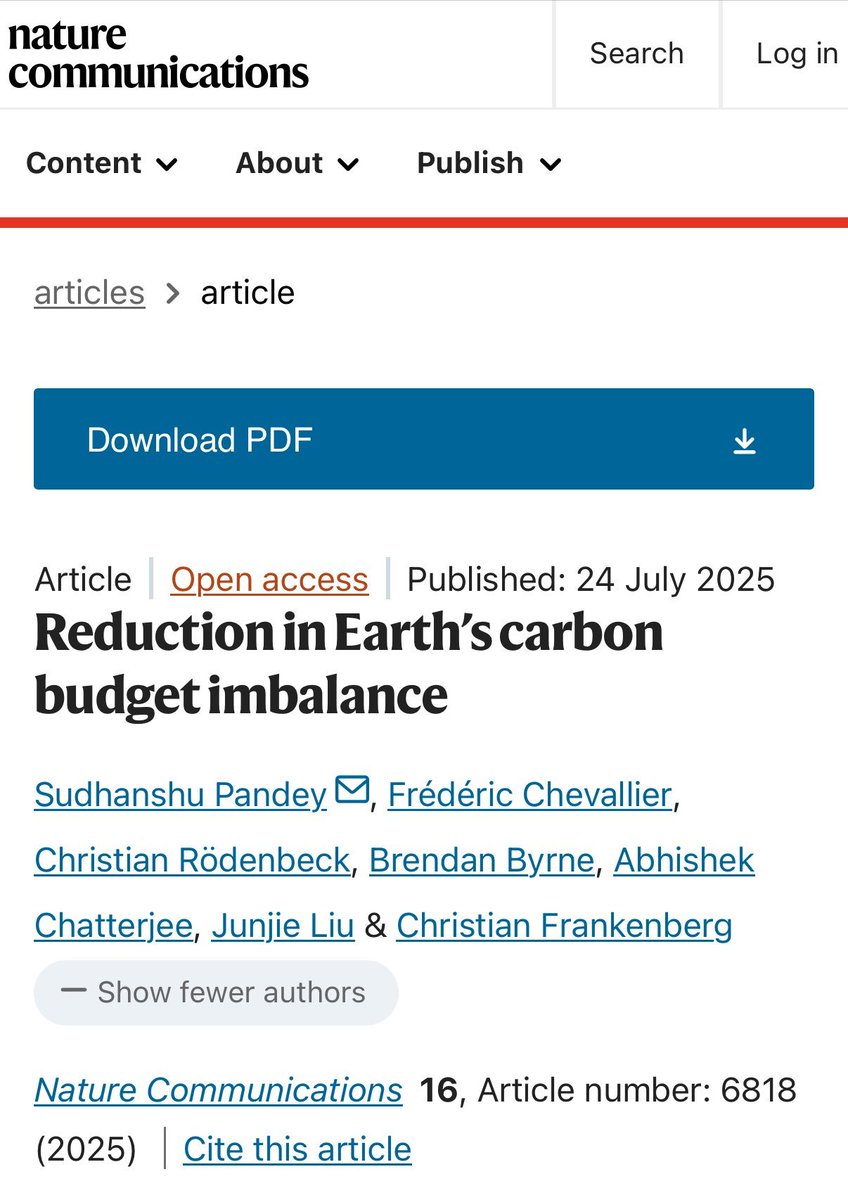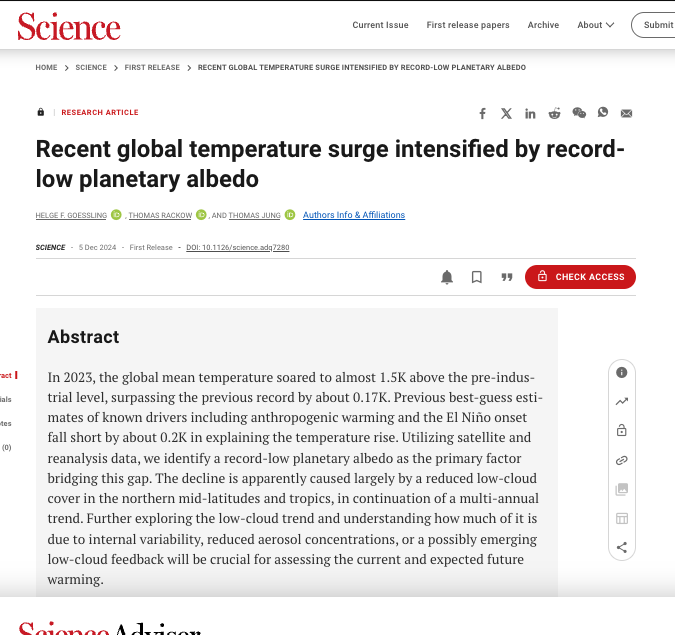
Professor studying contentious climate debates (aviation/rail; livestock/meat; GDP/Growth)! PhD in Geography. Co-Host https://t.co/9qZgWycdzP
2 subscribers
How to get URL link on X (Twitter) App







https://twitter.com/ryankatzrosene/status/19502941985963337952/ Energy Secretary hand-picked a 'diverse team' of five authors known for their rigor and honesty🙄


 2) One of the leading theories is that this dramatic decline in global CO2 concentrations was actually caused by the 'Great Dying' in the Americas - the mass mortality event caused by European viruses which wiped out 56 million Indigenous people of the "Americas"...
2) One of the leading theories is that this dramatic decline in global CO2 concentrations was actually caused by the 'Great Dying' in the Americas - the mass mortality event caused by European viruses which wiped out 56 million Indigenous people of the "Americas"... 


 2) The study makes an empirical estimate of the impact of global producer climate adaptations on yields of six staple crops spanning 12,658 regions, capturing two-thirds of global crop calories! It essentially tries to figure out not just how climate change will affect yields, but farmer adaptations as well!
2) The study makes an empirical estimate of the impact of global producer climate adaptations on yields of six staple crops spanning 12,658 regions, capturing two-thirds of global crop calories! It essentially tries to figure out not just how climate change will affect yields, but farmer adaptations as well!

 1) The Small Numbers Problem: Heading for 2.7 degrees of warming? An increase of up to 0.04% of CO2 in the atmosphere? These numbers SOUND small to most people. In reality, these are absolutely *MASSIVE* changes for Earth over such a relatively short period.
1) The Small Numbers Problem: Heading for 2.7 degrees of warming? An increase of up to 0.04% of CO2 in the atmosphere? These numbers SOUND small to most people. In reality, these are absolutely *MASSIVE* changes for Earth over such a relatively short period.

 “Commonly used ‘net zero’ budgets only give a 50/50 chance of limiting warming to well below 2°C. Put another way, the chance of them failing to limit warming is as high as the chance of them limiting warming.”
“Commonly used ‘net zero’ budgets only give a 50/50 chance of limiting warming to well below 2°C. Put another way, the chance of them failing to limit warming is as high as the chance of them limiting warming.” 

 “This analysis confirms that the rate of natural sequestration of CO2 from the atmosphere by the terrestrial biosphere is now declining, having reached a peak in 2008”… “This effect will accelerate climate change”
“This analysis confirms that the rate of natural sequestration of CO2 from the atmosphere by the terrestrial biosphere is now declining, having reached a peak in 2008”… “This effect will accelerate climate change” 

 2) To be clear, the Arctic Sea Ice Extent is still declining. At this very moment it is at record low levels (which is deeply alarming given that it's currently experiencing a La Niña Winter)... but the RATE of Sea Ice Extent decline *is* indeed slowing down.
2) To be clear, the Arctic Sea Ice Extent is still declining. At this very moment it is at record low levels (which is deeply alarming given that it's currently experiencing a La Niña Winter)... but the RATE of Sea Ice Extent decline *is* indeed slowing down. 

 2/ Building off his team’s work from earlier this year👇, Tselioudis and co. have found that cloud coverage has fallen by about 1.5% per decade for the last 35 years.
2/ Building off his team’s work from earlier this year👇, Tselioudis and co. have found that cloud coverage has fallen by about 1.5% per decade for the last 35 years. 

 2) Essentially the paper tried to explain the "missing 0.2C" that global climate models appeared to miss out on in 2023 after factoring in all we know about GHGs, El Niño, the peak of the Solar Cycle, Hunga Tonga, and even the Shipping Aerosols changes from IMO 2020.
2) Essentially the paper tried to explain the "missing 0.2C" that global climate models appeared to miss out on in 2023 after factoring in all we know about GHGs, El Niño, the peak of the Solar Cycle, Hunga Tonga, and even the Shipping Aerosols changes from IMO 2020. 



 2/ First, there's been a lot of confusion in the media and especially here on social media about what the pre-print meant by "The collapse time is estimated between 2037-2064... with a mean of 2050". The AMOC current is bi-modal, so generally it's ON or OFF, and once it passes a tipping point, MODELS suggest that there's a roughly 100-year freefall period towards collapse. Many were unclear (and I admit, I was not fully clear myself, and I apologize) on whether this implied that the *tipping point* has already occurred roughly 70 years ago and therefore that the current itself would be 'OFF' by 2050, or whether the *tipping point* was likely to be reached around 2050, meaning the full shutting off of the current would till be over a Century from now, closer to 2150.
2/ First, there's been a lot of confusion in the media and especially here on social media about what the pre-print meant by "The collapse time is estimated between 2037-2064... with a mean of 2050". The AMOC current is bi-modal, so generally it's ON or OFF, and once it passes a tipping point, MODELS suggest that there's a roughly 100-year freefall period towards collapse. Many were unclear (and I admit, I was not fully clear myself, and I apologize) on whether this implied that the *tipping point* has already occurred roughly 70 years ago and therefore that the current itself would be 'OFF' by 2050, or whether the *tipping point* was likely to be reached around 2050, meaning the full shutting off of the current would till be over a Century from now, closer to 2150.

 2/ WTF is the AMOC? It’s the ‘Atlantic Meridional Overturning Circulation’, which is a fancy name for an important ocean current that effectively serves as a ‘heat pump’ for Earth - bringing warm surface water from the tropics Northward, releasing its heat, sinking, then bringing deeper cold water back South.
2/ WTF is the AMOC? It’s the ‘Atlantic Meridional Overturning Circulation’, which is a fancy name for an important ocean current that effectively serves as a ‘heat pump’ for Earth - bringing warm surface water from the tropics Northward, releasing its heat, sinking, then bringing deeper cold water back South.

 2) In 1998 Mann and colleagues published a very important paper in Nature. They conducted an impressive study compiling temperature reconstructions for the last 6 Centuries, and found a startling 'hockey stick' shape: The world was warmer than it had been in nearly 600+ years!
2) In 1998 Mann and colleagues published a very important paper in Nature. They conducted an impressive study compiling temperature reconstructions for the last 6 Centuries, and found a startling 'hockey stick' shape: The world was warmer than it had been in nearly 600+ years! 

 2/ The study reviews chances of keeping global warming to within Paris Agreement bounds of 1.5C to 2.0C given the latest understandings of 5 key constraints: geophysical; technological; institutional; socio-cultural; and economic...
2/ The study reviews chances of keeping global warming to within Paris Agreement bounds of 1.5C to 2.0C given the latest understandings of 5 key constraints: geophysical; technological; institutional; socio-cultural; and economic...

https://twitter.com/ChrisMartzWX/status/18041863994339864752/ There've been many June heatwaves like this in the US before. And, the daily mean temp anomaly for Wednesday, June 19th (the peak day of the heat dome) wasn't very exceptional in much of the US East... (for that given day of the year).


https://twitter.com/ryankatzrosene/status/17101089297897598121) The thread noted a divide between what I called “accelerationists” who were sounding alarm that 2023’s remarkable warming was the beginning of SOMETHING NEW, and those I (later) called “observationalists”, who claimed 2023’s extreme warmth fits within EXPECTED WARMING trends.

 1) This story starts in 1988 when the Mulroney government created an Independent advisory council of experts called the National Roundtable on the Environment and the Economy. For 25 years it produced numerous reports on environmental policy, advising governments.
1) This story starts in 1988 when the Mulroney government created an Independent advisory council of experts called the National Roundtable on the Environment and the Economy. For 25 years it produced numerous reports on environmental policy, advising governments.

https://twitter.com/chrispyross/status/1775271218956161198First, as Chris has pointed out, this year it's a 23% increase on the tax rate relative to last year. But next year it will be an 18.75% increase and so on until it just stays fixed at $170/tonne - no longer increasing any more, year after year...